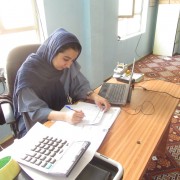Speeches Shim

After graduating from Herat University, Elham Waiezi attended numerous interviews, but potential employers were hesitant to make her an offer with no previous work experience. Elham was the only woman in her family to pursue higher education. Most of her relatives were married, settled down, and had children right after school. Like many young women graduating school, she was under pressure to follow the same path. Elham has always been a hard worker and fiercely determined to obtain her Master’s Degree in Public Administration. Unfortunately, having no income, she had to put her dreams of getting a Master’s Degree aside and look for a job.

Sadaf* is from Laghman Province in eastern Afghanistan. She has always had a passion for education. In 2013, she left Laghman to attend Nangarhar University. While at school, she worked part-time as a teacher for local private schools. Sadaf experienced many of the challenges that women in Afghanistan face in school, including discrimination and harassment. Four years later, she graduated with a degree in Teacher Training. She was determined to build a career that would help her make education more accessible for women.

Tuberculosis (TB) is a preventable and treatable disease, but unfortunately is one of the main public health problems in Afghanistan. The social stigma associated with having TB negatively impacts the early case detection. And even when patients identify TB, the expense of anti-TB drugs on the market often prohibit patients from being able to afford the full the treatment period required.

One of the significant challenges faced by the Ministry of Education (MoE) over the past 17 years was a lack of standard payroll procedures. Without standard procedures in place, employees and teacher had to deal with varying procedures across provinces and they did not have clear information about their benefits, including leave entitlements, overtime, taxation, and other allowances. In addition, ambiguous rules and procedures resulted in the MoE payroll and finance staff encountering glitches that prevented them from properly processing the payroll.

Afghanistan is ranked 172 out of 180 countries on Transparency International’s Corruption Perceptions Index. This is partly the result of recurring irregularities in the national electoral system. According to the Asia Foundation’s most recent Survey of the Afghan People, nearly half the population does not believe the next election will be free and fair.

Comment
Make a general inquiry or suggest an improvement.